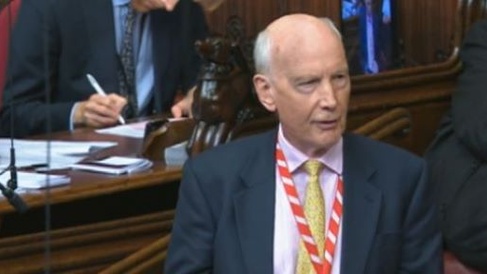
On 12 September, Lord Robert Mair CBE, founder of the Centre for Smart Infrastructure and Construction (CSIC) and Emeritus Professor of Engineering at the University of Cambridge, addressed the House of Lords on the escalating financial crisis in UK higher education. He highlighted the crucial role that international postgraduate students play in sustaining universities across the country.
Lord Mair began by welcoming Lord Tarassenko (University of Oxford) a new member and expert in healthcare engineering, noting the value of his future contributions in the House of Lords, which has too few engineers. He stressed the importance of such expertise in addressing key national challenges.
Turning to the financial strain on universities, Lord Mair expressed concern about the current tuition-fee system, pointing out that the maximum home fee of £9,250 has been eroded by inflation, worth only £6,000 in real terms compared to when the £9,000 fee was introduced in 2012. He cited Russell Group research showing that universities faced a deficit of £1,750 per home undergraduate student in 2021-2022, with this gap expected to widen to £4,000 by 2024-2025. "This is unsustainable and is already causing serious financial difficulties," he warned, suggesting that the Government may need to allow tuition fees to rise in line with inflation.
Lord Mair nevertheless also urged the Government to review key conditions of student loans to mitigate the impact of any fee increase on student debt, particularly for disadvantaged students. He called for changes to repayment thresholds and interest rates, alongside increased maintenance grants for students from lower-income backgrounds.
On the issue of international students, Lord Mair highlighted recent changes that prevent master’s students from bringing dependents with them. While postgraduate research students remain exempt from this rule, he emphasised the need to maintain competitive visa offers to attract top talent. He pointed out that a single cohort of international students generates £37 billion in economic benefits for the UK and that international postgraduate students are essential to the UK’s global research leadership in science, engineering and technology.
He noted that "Our universities rely heavily on international students for funding and research excellence”, adding that the UK must remain competitive with other major higher education destinations such as the US, Canada, Australia and Germany in terms of visa policies, fees and post-study work opportunities.
Lord Mair concluded by stressing the need for the Government to ensure that UK visa policies remain attractive to global talent, noting that international students are crucial to the future prosperity of both universities and the UK economy.
---------------------
Watch the debate here (Lord Mair’s speech is at 17.33.04)
Read the Hansard transcripts of the debate here
